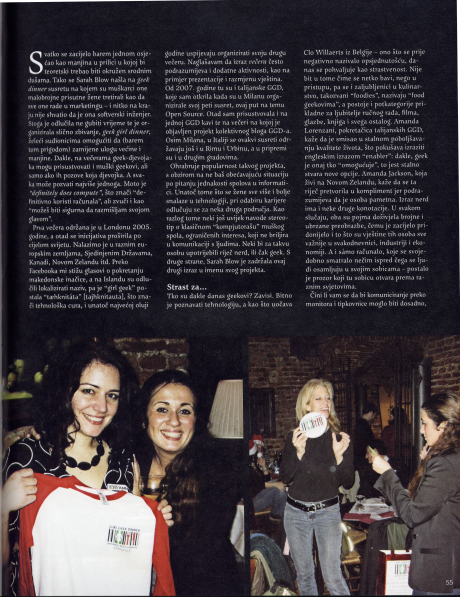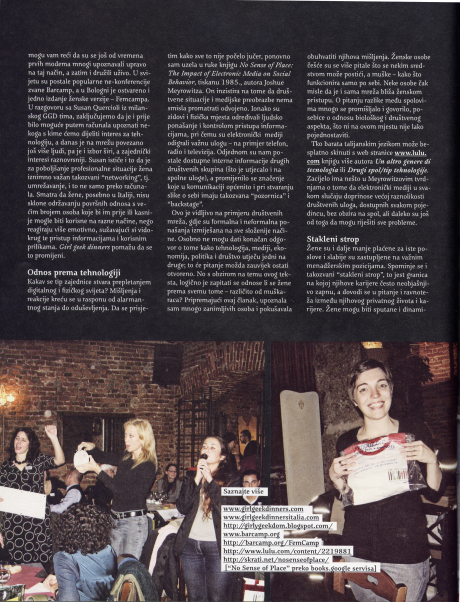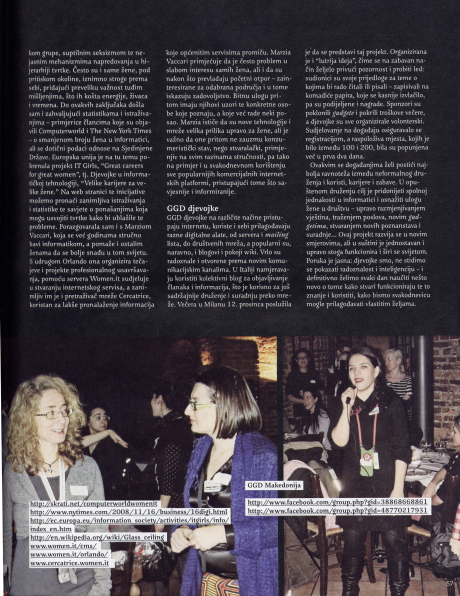Girl Geek Dinners in PlanB16 2009January
Posted: January 23rd, 2009 | Author: perplitudine | Filed under: PlanB, Portfolio | Comments Off on Girl Geek Dinners in PlanB16 2009January
[IT] Un blog multilingue. Scrollate finche’ non vi diventa intelligibile. Grazie.
[EN] A multilingual blog. Scroll until it becomes intelligible to you. Thanks.
[HR] Visejezicni blog. Scrollajte dok vam ne postane razumljiv. Hvala.
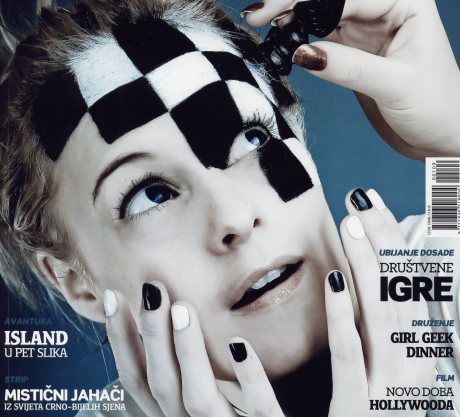
[IT] .
E’ uscito un altro
articolo scritto da me, sempre in Croazia, per la rivista Plan B. Il
numero e’ 16 (pagine ufficiali, borja.org), di gennaio 2009. Io ho scritto delle Girl Geek Dinners (mondo, Italia, Milano),
potete leggere un breve riassunto e vedere le scansioniseguendo il
collegamento “Continua”. Il testo e le traduzioni (it e en)
verrano dopo. Per quanto riguarda il resto del numero, l’editoriale
(della redattrice Ana Penovic) spiega che il contesto e’ ancora
segnato dalla crisi (economica), ma racconta che da quelle parti la
gente ha un atteggiamento un po’ stile “noi abbiamo gia’ dato,
adesso ci concediamo quello che vogliamo”, perche’ qualche decennio
fa quel paese, qualsiasi paese era al epoca, ha gia’ vissuto le file
e la austerita’ e quant’altro. Quindi il numero e’ dedicato a quelli
che cercano di vivere, creativamente, al interno delle proprie
possibilita’, quindi si parla del mangiar sano, dei giochi da tavolo,
artisti che decidono le proprie priorita’, del fumetto in Croazia, e,
appunto – delle Girl Geek Dinners, che sarebbe il mio articolo (3
pagine)! Vorrei ringraziare tutte le fantastiche donne che mi hanno
aiutato a fare la ricerca, con consigli (segnalando anche
l’iniziativa EU – IT Girls, o il libro su lulu.com), con interviste,
con racconti, e quelle che organizzano le cene, per tutto il lavoro
volontario che ci mettono tutte le volte. La prossima cena a Milano
(sul tema dell’identita’ online e i motori di ricerca) e’ il 20.2., e
le iscrizioni si aprono circa una settimana prima, normalmente.
“Continua” [riassunto/scansioni]
[EN] .
Another article written by
me is out, again in Croatia, for the Plan B magazine. The number is
16 (official pages, borja.org), of January 2009. I’ve written about the Girl Geek Dinners (world, Italy, Milan), and
you can read a brief summary and see the page scans by clicking
“Continua”. The text and the translation (it and en) will come
later on. Regarding the rest of this number, the editorial (by the
editor Ana Penovic) explains that the context is still marked by the
crisis (economical), but narrates how the people over there has this
attitude a bit like “been there, done that, now we can indulge
ourselves in what we want”, because some decades back the country,
whichever country it was at the time, had already lived the waiting
in lines and the austerity and what have you. Thus the number is
dedicated to those who try to live, creatively, inside their
possibilities, so there’s talk of healthy eating, board games, artist
who decide on their own priorities, comics in Croatia, and –
clearly – Girl Geek Dinners, which would be my (3 page) article. I
would like to help all the fantastic women who have helped me with
the research, through advice (telling me about the EU initiative – IT Girls, or the lulu.com book), through interviews, through stories,
and those of them who organize the dinners, for all the voluntary
work they put into it every time. The next dinner, in Milan (the
theme of online identity and the search engines), is on February the
20th, and “Continua” [summary/page scans]
[HR]
Jos jedan moj clanak je
objavljen, opet u Hrvatskoj, za casopis Plan B. Broj je 16. (sluzbene stranice, borja.org), za
sjecanj 2009. Ja sam pisala o Girl Geek Dinners (svijet, Italija, Milano), i moze se procitati
kratki sadrzaj i vidjeti skanirane stranice slijedeci link
"Continua". Tekst i prijevodi (it i en) ce doci kasnije.
Sto se tice ostatka broja, uvodnik (urednice Ane Penovic) objasnjava
da je kontekst i dalje obiljezen krizom (ekonomskom), ali pripovijeda
kako ljudi tamo imaju taj neki stav kao "vec smo svoje vec dali,
sad cemo si priustiti ono sto zelimo", jer je prije koje
desetljece ta zemlja, koja god da je onda to zemlja bila, prozivjela
vec cekanje u redu i strogost ["austerity"] i sto vec ne.
Tako je broj posvecen onima koji zive, na kreativan nacin, unutar
svojih mogucnosti, pa se pise o zdravoj prehrani, drustvenim igrama,
umjetnicima koji sami odredjuju svoje prioritete, stripovima u
Hrvatskoj, i – jasno – Girl Geek Dinners, dakle moj tekst (od 3
stranice). Htjela bih zahvaliti svim divnim zenama koje su mi pomogle
u istrazivanju, kroz savjete (ukazujuci mi na primjer na EU
inicijativu IT Girls, ili na knjigu sa lulu.com), kroz intervjue,
kroz price, i onima od njih koje organiziraju te vecere, za sav
volonterski rad koji u to ulazu svaki put. Slijedeca vecera, u Milanu
(tema identitet online i web pretrazivaci), je 20.2. a upisi su oko
sedmicu dana prije:) "Continua" [kratki sadrzaj/skanirane
stranice]
[[[SOME LINKS ]]]
http://girlgeekdinners.com/ | http://www.girlgeekdinnersitalia.com/
http://www.girlgeekdinnersmilano.com/ | http://girlygeekdom.blogspot.com/
http://www.barcamp.org/ | http://barcamp.org/FemCamp
"Un altro genere di tecnologia" - http://www.lulu.com/content/2219881
http://skrati.net/nosenseofplace/ or directly google.books
http://skrati.net/computerworldwomenit | http://www.nytimes.com/2008/11/16/business/16digi.html
IT Girls, EU - http://ec.europa.eu/information_society/activities/itgirls/info/index_en.htm
http://en.wikipedia.org/wiki/Glass_ceiling
http://women.it/cms/
http://www.women.it/orlando/ | http://cercatrice.women.it/
.
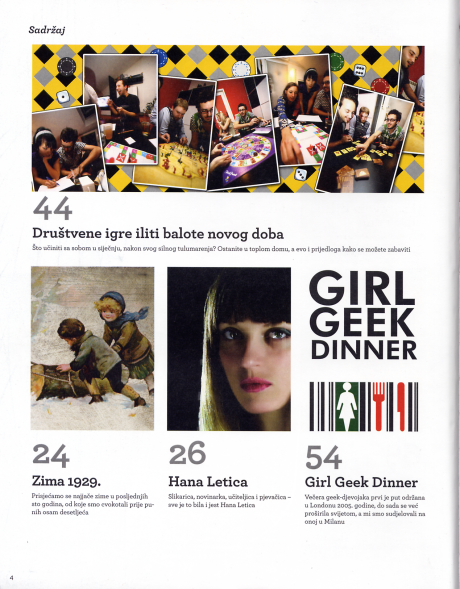
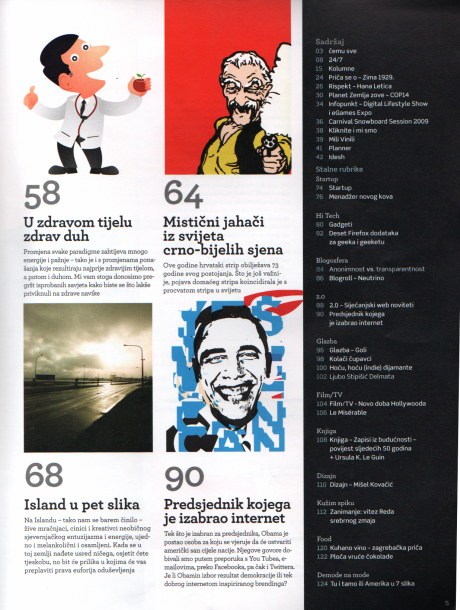
[IT] L’articolo comincia con il racconto di come il progetto Girl Geek Dinners ha avuto inizio, a Londra nel 2005 quando la software engineer Sarah Blow era andata alla Geek Dinner, dove l’hanno trattata come se di tecnologia non sapesse nulla. Allora ha deciso di creare un contesto nuovo, non per escludere gli uomini, ma rovescia le proporzioni, cose si invertono un po’ i ruoli della minoranza e maggioranza. Altre cene Girl Geek poi spuntano in giro per il mondo, e adesso pare si stia cercando di organizzare qualcosa anche in Macedonia. Sicuramente c’e’ bisogno per un progetto del genere, perche’ la situazione per le donne, in informatica, non e’ promettente. Questo si vede anche dei statistiche fornite della UE, al interno del progetto IT Girls, “Great careers for great women”. Nonostante le donne sono sempre piu’ capaci nel uso della tecnologia, sempre meno la scelgono come carriera o ambito di studi universitari. La parte del problema sono la mancanza dei “role model” e gli stereotipi negativi. Per il primo, aiuta che le donne che lavorano in tecnologia o ne sono interessate si conoscono tra di loro, e per il secondo, sicuramente si ridefinisce nel modo positivo il termine geek, quale ha avuto diverse evoluzioni. Amanda Lorenzani, che ha avviato le GGD in Italia, per descrivere i geek usa addirittura il termine “enabler”, quello che rende cose possibili, crea nuove opzioni.
[EN] The article begins with the story of how the Girl Geek Dinners project had started, in London in 2005, when the software engineer Sarah Blow went to a Geek Dinner, where she was treated as if she knew nothing about technology. So she decided to created a new context, not to exclude the men, but in order to turn the proportions upside down, thus inverting the roles of minority and majority. Other dinners appear around the world, and now it appears they are trying to organize something in Macedonia as well. Certainly there is a need for projects like that, because the situation, for women, in informatics, is not promising. This is noticeable also from the statistics made available by the EU, as a part of the project IT Girls, “Great careers for great women”. Even if women are increasingly capable in the use of technology, they choose other fields when it comes to their careers or college educations. A part of the problem could be in the lack of role models and in the negative stereotypes. As far as the first one, it is helpful that the women who work in tech or are interested in it should know each other, and as for the second, the term geek, which has had different evolutions, is certainly being redefined in a positive light. Amanda Lorenzani, who has started the Italian GGD, actually describes the geeks with the word “enabler”, as the ones who enables, creates new options.
[HR] Clanak pocinje pricom o pocetku projekta Girl Geek Dinners, u Londonu 2005., kada je softverska inzinjerka Sarah Blow otisla na Geek Dinner, gdje su se prema njoj ponasali kao da ne zna nista o tehnologiji. Tako je odlucila stvoriti novi kontekst, ne da bi iskljucila muskarce, nego da bi preokrenula proporcije, i tako zamjenila uloge manjine i vecine. Druge GGD vecere se pojavljuju sirom svijeta, a izgleda da pokusavaju nesto organizirati i u Makedoniji. Sigurno postoji potreba za takvim projektima, jer buducnost za zene, u informatici, nije obecavajuca. To se primjecuje i iz statistika koje stavlja na raspolaganje EU, u sklopu projekta IT Girls, “Great careers for great women”. Unatoc tome sto se one sve bolje sluze tehnologijom, po pitanju tehnologije i fakulteta biraju neka druga podrucja. Dio problema bi mogli biti nedostatak pozitivnih primjera i negativni stereotipi. Sto se prvog tice, sigurno pomaze sto se zene koje rade u polju tehnologije ili se za nju zanimaju, upoznaju medju sobom, sto se drugog tice, pojam geek je sigurno ovako redefiniran, nakon raznih svojih evolucija, u skroz povoljnom svijetlu. Amanda Lorenzani, koja je zapocela talijanske GGD, cak opisuje geekove izrazom "enabler", kao one koji omogucuje, stvara nove opcije.
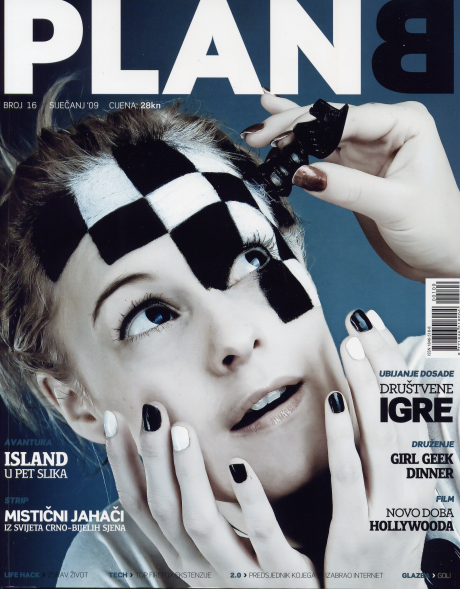
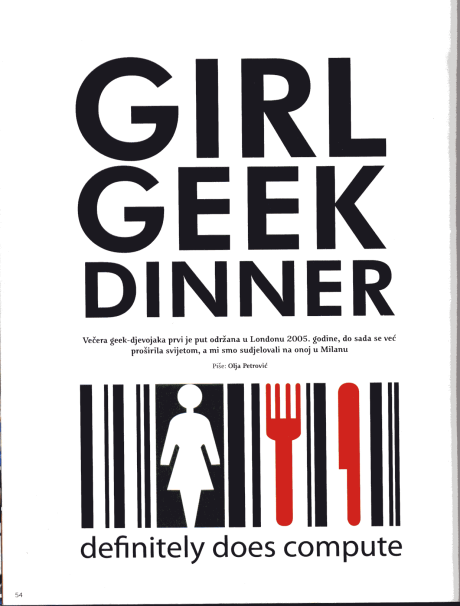
[IT]
Per
la questione delle comunita’ online/offline, per metterla in
prospettiva, menziono il libro di Joshua Meyrowitz (link books.google), “No
Sense of Place:
The
Impact of Electronic Media on Social Behaviour” (Oltre il senso del
luogo. L’impatto dei media elettronici sul comportamento sociale),
del 1985, dove lui prende in considerazione gia’ il telefono, la
radio e la TV come cause di grossi cambiamenti. Il “luogo” citato
nel titolo e’ inteso attraverso il concetto dell’accesso alle
informazioni, perche’ le mura di case e di stanze, non servono solo a
a tenere fuori il freddo, ma determinano chi sente e vede cosa. Cito
anche un libro, che si trova online gratuitamente – “Un altro
genere di tecnologia”. C’e’ anche una parte dell’articolo dove
intervisto Marzia Vaccari, dell’associazione Orlando, del
server/progetto Women.it, e cosi’ via, quale ci ricorda di non essere
consumatrici, ma creatrici, sia realizzando degli strumenti propri
sia nel come usiamo quelli esistenti in modo creativo. Alla fine
descrivo un po’ la cena stessa, e il nuovo progetto delle GGD
Italiane – il blog tematico collettivo, e concludo con una
ottimistica nota sull’autodeterminazione:).
[EN]
As
far as the subject of the online/offline comunities, in order to put
it in perspective, I mention the book by Joshua Meyrowitz (link books.google), No
Sense of Place:
The Impact of
Electronic Media on Social Behaviour”, from 1985, where he takes
into consideration even the telephone, the radio and TV as the causes
of big changes. The “place”, as cited in the title, is intended
through the concept of access to information, because the house and
room walls do not serve only to keep out the cold, but determine who
can hear and see what. I also cite another book, available freely for
download on lulu.com – “Un altro
genere di tecnologia” (another
gender/kind of technology). There’s also a part of the article where
I interview Marzia Vaccari, from the organization Orlando and the
server/project Women.it, etc., who reminds us not to be just
consumers, but creators, be it by realizing our own tools, or when we
are using those that already exist in a creative way. In the end I
describe the dinner in itself, and the new project started by the
Italian GGD team – a thematic collective blog, and then I conclude
with an optimistic note on self-determination:).
[HR]
Sto
se tice pitanja online/offline zajednica, da bih to stavila u
perspektivu, spominjem knjigu koju je napisao Joshua Meyrowitz (link books.google)i kuca i soba ne sluze
samo da ne udje hladnoca, nego i da se odredi tko moze sto cuti i
vidjeti. Spominjem jos jednu knjigu, koju mozemo skinuti besplatno sa
interneta na lulu.com – “Un altro
genere di tecnologia”
(drugi spol/tip tehnologije). Tu je i jedan dio clanka u kojem
intervjuiram Marziu Vaccari, iz udruge Orlando, i projekta/servera Women.it, itd., koja nas podsjeca da ne budemo samo konzumerke, nego
stvarateljice, bilo da ostvarujemo vlastita orudja ili koristimo vec
postojeca na kreativan nacin. Na kraju opisujem samu veceru, i novi
projekt pokrenut od talijanskog GGD tima – tematski kolektivni
blog, i zatim zakljucujem optimistickom notom o samo-ostvarenju:).
